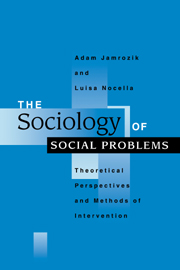Book contents
- Frontmatter
- Contents
- List of Tables
- List of Figures
- Preface and Acknowledgements
- 1 Introduction: Theoretical Perspectives on Social Problems
- 2 Contemporary Perspectives on Social Problems
- 3 Methods of Intervention in Social Problems
- 4 Social Actors in Social Problems
- 5 Challenges of Contemporary Social Problems
- 6 Social Problems in the Residualist Conversion Perspective
- 7 Inequality – The Underlying Universal Issue in Social Problems
- 8 The Social Construction of Family Problems
- 9 The Problem of Social Order
- 10 The Theory of Residualist Conversion: Does it Meet the Test?
- 11 Conclusions and Implications
- Bibliography
- Index
4 - Social Actors in Social Problems
Published online by Cambridge University Press: 29 March 2011
- Frontmatter
- Contents
- List of Tables
- List of Figures
- Preface and Acknowledgements
- 1 Introduction: Theoretical Perspectives on Social Problems
- 2 Contemporary Perspectives on Social Problems
- 3 Methods of Intervention in Social Problems
- 4 Social Actors in Social Problems
- 5 Challenges of Contemporary Social Problems
- 6 Social Problems in the Residualist Conversion Perspective
- 7 Inequality – The Underlying Universal Issue in Social Problems
- 8 The Social Construction of Family Problems
- 9 The Problem of Social Order
- 10 The Theory of Residualist Conversion: Does it Meet the Test?
- 11 Conclusions and Implications
- Bibliography
- Index
Summary
To speak of things social is to speak of things related to humanity, to human agency. This seemingly trivial observation is of central significance when speaking of social problems. It implies that social problems are in essence caused by people, are maintained by people, and are solved, attenuated or controlled by people. It is an observation that needs to be made and fully appreciated because what appears to be simple and obvious is in practice not as simple as that, or is not acted upon as such, leading at times to interesting and/or serious outcomes.
The relationship between theories of social problems and methods of intervention is more closely examined in this chapter, with a focus on the human agency – that is, on the roles played by certain social actors in the perception and intepretation of social problems and methods of intervention. What determines the methods of intervention: theories and practice wisdom, practice interests, or both? Why do certain practices persist despite strong evidence of their ineffectiveness? Is there always a second purpose in the manifest purpose; a hidden agenda? On what evidence are new theories formed? How are new intervention methods developed? Is it usually a case of ‘old wine in new bottles’ – that is, does the ‘real’ societal purpose of social control measures (being maintenance of class and sectional interests etc.) persist in various forms and disguises?
- Type
- Chapter
- Information
- The Sociology of Social ProblemsTheoretical Perspectives and Methods of Intervention, pp. 61 - 77Publisher: Cambridge University PressPrint publication year: 1998



